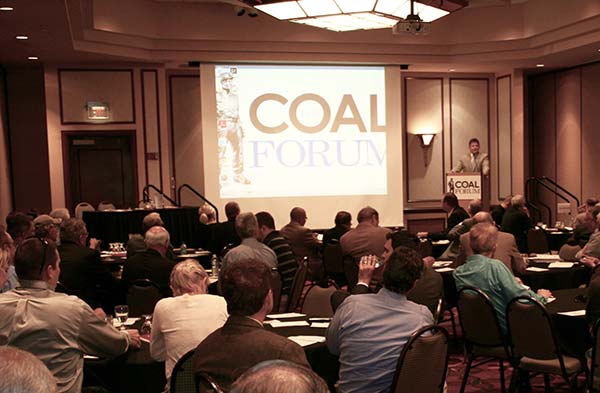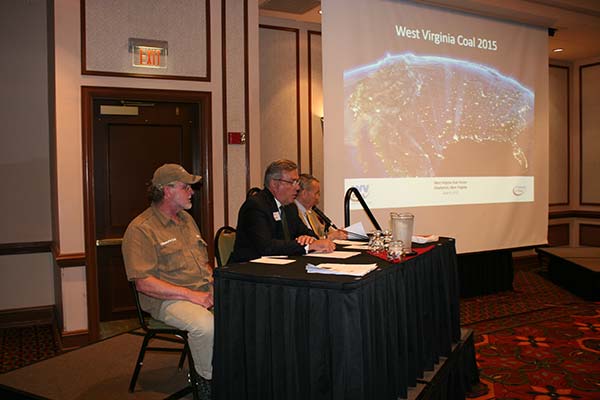
CHARLESTON – Industry and community leaders joined together with key lawmakers at the kickoff to a series of coal forums forum in Charleston Tuesday entitled “West Virginia Coal – 2015 & Beyond.”
The event was hosted by the West Virginia Coal Forum, which is an organization that represents both labor and management in the coal industry.
The program is the first in a series of events intended to bring attention to the impacts already created by potential impact of the U.S. Environmental Protection Agency's proposed Clean Power Plan.
In opening the event, Chris Hamilton, senior vice president of the West Virginia Coal Association and co-chairman of the Coal Forum, said clearly that the situation has now reached crisis level.
To address the issue, Hamilton said the Coal Forum plans to send a letter to Gov. Earl Ray Tomblin to save those plants.
“I'm told that train has left the station,” Hamilton said. “Maybe it's too late, but we're going to ask."
After six and a half years of fighting, Hamilton seemed to acknowledge a fear that people were beginning to lose hope. He said, however, that now is the time to become even more active – to step up and redouble the fight.
It’s time for people to “get a little more radical,” Hamilton said, to try and stop the coal industry decline. And he challenged both the crowd and the political leaders at both the state and federal level to step up their games.
“It's time that we ask for bolder decisions of our elected officials,” Hamilton added, “and it's time they ask for bolder actions.”
Hamilton then moved on to the second issue – the increased competition from natural gas.
“We're not going to stand by and trade these coal jobs for gas jobs or any other renewable jobs,” Hamilton said, seeming to echo the sentiment expressed by UMWA President Cecil Roberts during a meeting in Morgantown last week, who said “most natural gas job are temporary jobs.”
As coal-fired power has gradually declined, natural gas has been put in the spotlight as a potential “replacement” for coal in terms of supply, price and reliability, but Hamilton said the forum won't allow the competitor fuel to take over.
Senators Joe Manchin, D-W.Va., and Shelley Moore Capito, R-W.Va., offered their sentiments from Washington, D.C. via video messages. Both legislators highlighted efforts being made on the federal level to stop the “EPA overreach.”
West Virginia state officials, including Senate President Bill Cole and State Attorney General Patrick Morrisey, also spoke at the event. Morrisey told the crowd that the Mountain State has led a 15-state coalition to stop the Clean Power Plan in its preliminary stages, acknowledging yesterday’s decision by the court that it's too early to challenge a proposed rule that isn't yet final.
Morrisey remains optimistic.
“We did not get the immediate result we wanted, but we're encouraged with the long-term prospects,” Morrisey told forum attendees. “I think we've been able to tease out a lot of substance from EPA.
“Unfortunately, we know we have a president who will literally stop at nothing to restrict the use of coal in West Virginia. (But) I see a very bright future for coal in the state of West Virginia.
“Keep the faith. We are going to prevail. It's just a matter of time.” Morrisey said.
Cole told the crowd a lot had been accomplished during the past session to help the industry at the state level, but much remains to be done. He acknowledged his recent announcement of a gubernatorial bid in 2016, but said the 2016 Legislative session remains is primary focus.
"The work’s just begun. We’re looking forward to next session,” Cole said. “"That light at the end of the tunnel? That's a miner's hat or light bulb powered by coal and it's going to stay that way."
Jeff Herholdt with the West Virginia Division of Energy also addressed potential economic impacts under Clean Power Plan, including projections that electric bills would rise by 26 percent and gas bills would rise by 60 percent under the rule.
John Christy, a climate scientist at the University of Alabama in Huntsville, also spoke in opposition to the proposed federal regulations.
“The theory is not right, and we do not understand the science of climate." Christy said.
“Climate change is a political issue,” he added.
Closing the session was a panel discussion featuring Bill Raney, president of the West Virginia Coal Association; Mark Dempsey, vice president of Appalachian Power; and Roger Horton, president of United Citizens for Coal.
Echoing both Hamilton and Sen. Manchin in his comments, Horton stressed the importance of making yourselves heard.
“You have to become more deeply involved in saving the coal industry,” Horton said. “I have been retired for two years and I am working on this every day. And one thing I can promise you, come hell or high water, we're going to fight to the very end."
And Dempsey said that the utility industry is concerned about potential electricity shortages with the closure of so many plants. In fact, he said, quite matter-of-factly that shortages would happen if we see extreme cold temperatures in the future.
“If we have another winter like the past couple of years, we WILL see blackouts and brownouts in PJM region," Dempsey said.
Raney said that while there had been ups and downs in the coal industry in the past, this time it is different. Repeating something he has said often in the past, Raney said the industry can compete if the playing field is level, but “the field isn’t level today.”
The next Coal Forum meeting will be held from 9:00 – 11:30 a.m. on Thursday, July 23rd at the Quality Inn & Conference Center in Bluefield. To register, or for additional information, visit www.wvcoalforum.org .
